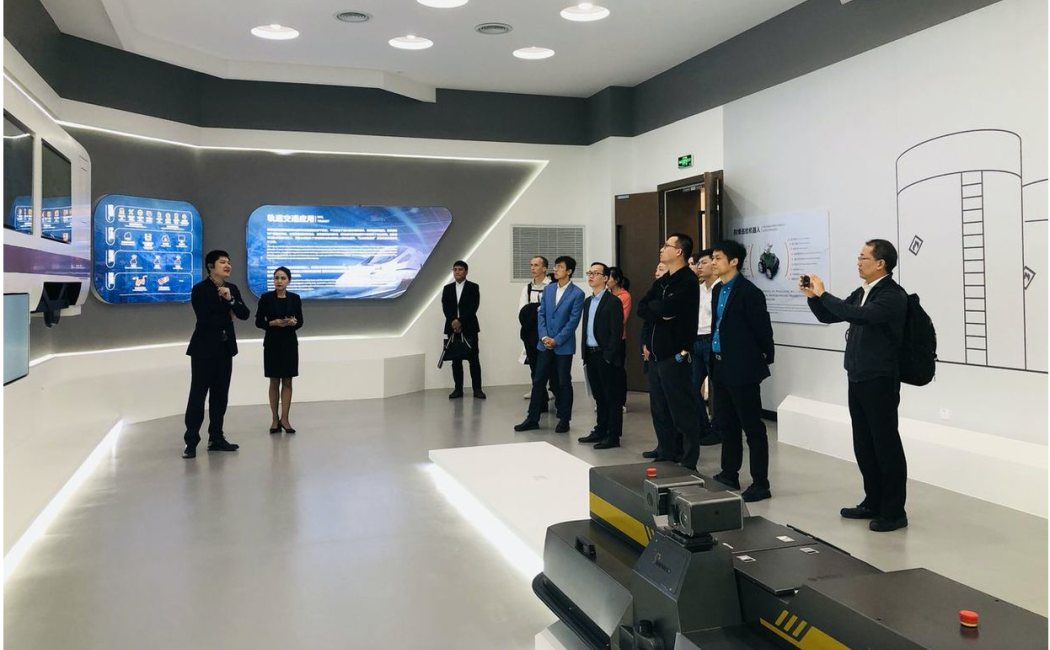Photo above: Junjie Xiong (left) takes members of the Chinese alumni community on a tour of Hangzhou Shenhao Technology.
Junjie Xiong first heard from his tutor that KAUST was recruiting while preparing to continue his graduate studies at
Imperial College in London, where he completed his undergraduate degree. Knowing Junjie was someone who loved to explore the unknown world, the tutor encouraged Junjie to consider applying to KAUST. Before long, Junjie had escaped the rain of England to study in Saudi Arabia where, after graduating from KAUST with an MS in Mechanical Engineering, Junjie continued to work in the Kingdom for another three years in
SABIC’s Yanbu office.
Returning home on the Silk Road to China
When it came time for him to return home, Junjie chose not to go the usual route by hopping on a plane, and decided instead to follow the Silk Road back to China. This was an incredible journey he made overland using only public transport. The return home took him roughly half a year.
After a short direct flight from Jordan (the only flight on his return to China), he spent almost a month in the small country of Lebanon. “I visited every inch of this country. Every page of Lonely Planet I knew from there.” Then he took an unforgettable ten-hour ferry ride up to Turkey. Unforgettable because he suffered with sea sickness for the first time. The only countries he avoided on his route were those at war. The last leg of this odyssey took him through Pakistan to the border of China.
“Whenever I face new challenges, I remind myself I was able to enter those areas that people were afraid of.” Even though Junjie travelled alone, he made a lot of good friends along the way. At each stage he’d make a friend and they’d travel for the next few days together. Junjie tells Alumni Affairs he would love to do another trip like this but not at the moment now that he has started a family. In the future he hopes to do a journey like this,
“in South America…or maybe Alaska,” he says eagerly.
After the trip Junjie admits he found it difficult to transition back to a normal life, as he had become so used to every day being different while on the road.
“But I found something to do - I ran a HotPot restaurant and applied for my MBA course during those difficult days.”
Junjie has had a varied career and he hopes he can be a model for those who start in engineering and end up somewhere else.
The Pivot into Business
Professionally, Junjie now works for
Hangzhou Shenhao Technology Co. Ltd. Initially recruited as an Assistant to the Chairman after finishing his MBA in China and then taking a new assignment as the VP of Products, he was recently promoted to Chief Operating Officer. Junjie finds focusing on the everyday details different from the area of new product development, but his background in engineering has helped him to get where he is because it enables him to have a deeper understanding of the company’s products.
He strongly believes the experience of studying a different type of engineering at KAUST helped him considerably. Graduating from Imperial College as a Material Scientist was different from Mechanical Engineering which he was later exposed to at KAUST. It was after his KAUST tutor told him, “you cannot have two masters in the same subject,” that Junjie decided to pivot towards Mechanical Engineering; a choice that had him camping in the KAUST library to revise.
While Junjie no longer works as an engineer, he explains that keeping a company operational isn’t that different from an engineer knowing how to keep physical things running. The one difference, Junjie joked is that with a company you are dealing with human beings, which sometimes means you need to read peoples’ minds.
“Not something they teach in Engineering!” Junjie says with a laugh.
Robots
Two epidemic-inspection robots built by Junjie's company Hangzhou Shenhao Technology Co. Ltd. arrived at KAUST from China in the last few weeks. Known as the Health Guard Robot, its functions include temperature screening and facial recognition of those wearing a mask.
“Robotic systems are pretty exotic things. Many small systems are integrated to achieve very complex functions. Localization, navigation, optical avoidance and so on.” Junjie explains.
Going forward, if Junjie has his way, Shenhao Technology would like to set up a service center in the Middle East to support clients regionally. Despite business all over slowing down during the pandemic, Shenhao has sold over 400 units of these robots. “In the crises we found opportunity,” says Junjie.



Leave a Reply
Your email address will not be published. Required fields are marked *